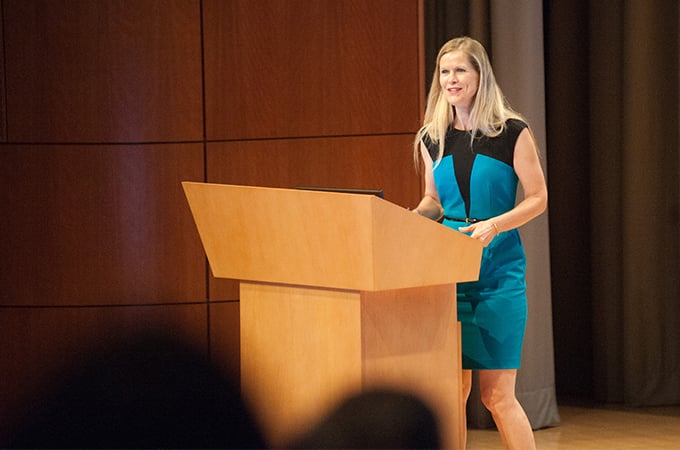“Politics in 2018 is really a story about who you are,” said Renée Van Vechten, a University of Redlands political science professor, as she began her recent talk on political trends and recent changes to California’s election system.
During her talk, which was as part of the Redlands Forum series, Van Vechten explained how social identity contributes to political party preference and how identity-related issues are widening the chasm between Republicans and Democrats in both government and society. “The clusters of values, fears, and ideals that Republicans and Democrats hold dear are quite different,” she said. “The two groups fundamentally disagree about how to respond to massive social changes that have emerged over the last 50 years.” These changes include globalization, shifting immigration patterns, increased racial and ethnic diversity, technological advances, and transformations in gender roles.
Using research-based studies, Van Vechten argued that new party alignments have resulted from these developments. People who voted for Barack Obama and Hillary Clinton in past elections are more likely to have benefitted from the new globalized and technologically advanced economy, tend to be highly educated, and are part of the growing non-white majority. On the other hand, those who voted for John McCain, Mitt Romney, and Donald Trump are more likely to feel distressed by global and social changes and the resulting economic effects, and are more likely to live in rural areas, and be more religious than their Democratic counterparts.
“This gives us a picture of the polarized electorate,” said Van Vechten. “Increasingly, party identification has become a strong filter for how we think and feel about our fellow Americans. We listen to people like us and trade emails, slanted articles, and inflammatory videos with our friends. Our differences are reinforced by political leaders who adopt uncivil rhetoric to describe the people they don’t like or agree with.”
This modern political divide is visible in current political trends and will impact the midterm elections. Van Vechten expanded on four main trends emerging at both state and national levels:
- Partisanship is still the strongest predictor of one's vote. “In 2016, 90 percent of Republicans voted for Donald Trump, and 90 percent of Democrats voted for Hillary Clinton.”
- Partisanship drives judgment, regardless of objective facts. “When we are presented with information that doesn’t agree with who we are, we tend to not accept it.”
- Negative partisanship has increased sharply. “We have not just unfavorable but strongly unfavorable feelings about people in the opposite party.”
- Political elites are similarly polarized. “Politicians are just as polarized as their constituents.”
Shifting the focus of her remarks to California politics, Van Vechten went on to explain how legislative and electoral processes have recently been disrupted by initiatives. Along with 23 other states, California employs a ballot initiative process, which gives citizens a chance to propose laws without the support of a governor or legislature. This November, Van Vechten said, nine out of the 11 initiatives on the ballot were submitted by citizens or political groups.
“These initiatives have brought about some highly disruptive reforms, such as term limits,” she said. “Term limits affect how long a lawmaker is allowed to stay in the state assembly or senate. These limits have led to rapid turnover and demographic changes, helping to make the legislature much more diverse.”
Another initiative that has changed the face of California government is the top-two primary initiative, passed in 2010, which states that all candidates, regardless of party, run against each other in the primary election and the two candidates with the most votes advance to the general election. Van Vechten noted that this system has often resulted in two Democrats running against each other in the final race, or two Republicans running against each other. The reform appears to have led to the election of more Democrats who support business-friendly legislation.
Access to voter registration and vote centers are among many other factors that will influence election results, according to Van Vechten.
In concluding her talk, Van Vechten encouraged members of the audience to vote on November 6 and paraphrased Aristotle, saying, “Men, and women, are political animals.”
Next up in the Redlands Forum, which is co-hosted by Esri and University of Redlands Town and Gown, is “Today at the University of Redlands,” featuring a panel of University of Redlands students moderated by former Redlands mayor and founder of Town and Gown Carole Beswick. Registration, which opens one week prior to the talk, is required. For more information, see the Redlands Forum website.






